
Madurai is a major city in the Indian state of Tamil Nadu. It is the cultural capital of Tamil Nadu and the administrative headquarters of Madurai District and Pandya Nadu, the third largest city in Tamil Nadu and 44th most populated city in India. Located on the banks of River Vaigai, Madurai has been a major settlement for two millennia.

Shrine of Pir Hadi Hassan Bux Shah Jilani at Duthro Sharif in Sanghar District, Pakistan.

Kayalpattinam is a Municipality in Thoothukudi district in the Indian state of Tamil Nadu. As of 2011, the town had a population of 40,558.

The Arabic word Maqbara is derived from the word Qabr, which means grave. Though maqbara refers to the graves of all Muslims, it refers especially to a Muslim cemetery. In some Islamic cultures it refers also to the graves of religious figures or Waliyullahs considered to have dedicated their life to Islam, striving to be true Muslims and training others to follow Islam as preached by the Islamic prophet Muhammad. In Asian countries, maqbara also refers to the Dargah of Waliyullahs, Sufis, Sheikhs, Imams, Qutbs and Ghouses. There are many Dargahs of Waliyullahs all over India, and their maqbaras are found therein.

Erwadi is a village in Ramanathapuram District, Tamil Nadu, a state in South India. It belongs to Kilakarai Taluk and town panchayat. The village is the location of the grave and shrine of Qutbus Sultan Syed Ibrahim Shaheed Badusha, the previous ruler of Medina. Erwadi also belongs to Kadaladi assembly constituency, which is a part of Ramanathapuram. However, after the delimitations in 2009, Erwadi has been joined to the Ramanathapuram assembly constituency. Although a small town, Erwadi is the second largest contributor for the revenue of Ramanthapuram District.
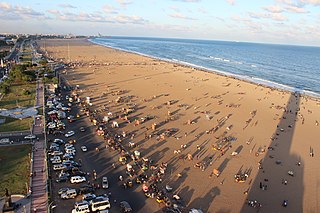
Tamil Nadu is a state in the south-eastern part of the Indian Peninsula. Tamil Nadu is previously a part of the United Madras Province, which was later partitioned based on languages. Tamil Nadu has more than 4,000 years of continuous cultural history. Tamil Nadu has some of the most remarkable temple architecture in the country, and a living tradition of music, dance, folk arts and fine arts. Tamil Nadu is well renowned for its temple towns and heritage sites, hill stations, waterfalls, national parks, local cuisine and the natural environment and wildlife. The state has the largest tourism industry in India with an annual growth rate of 16%. In 2015, the number of domestic arrivals was at 333.5 million making the state the most popular tourist destination in the country, and foreign arrivals numbered 4.68 million, the highest in the country, making it the most popular state for tourism in the country.
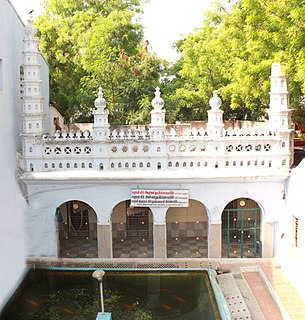
Madurai Maqbara refers to the Dargahs of three Sufi saints: Mir Ahmad Ibrahim, Mir Amjad Ibrahim, and Abdus Salaam Ibrahim situated in Kazimar Big Mosque, Madurai, India.

Kazimar Street is an ancient street in Madurai, India, dating from the 13th century. Kazi Syed Tajuddin is the one who settled here after preaching Islam in South India. 99.2% population of this street are Muslims and 0.8% Hindus. The famous Kazimar periya pallivasal, which is the first Muslims' place of worship in madurai, Madurai Maqbara the dargah of famous Madurai Hazrats are located in this street.
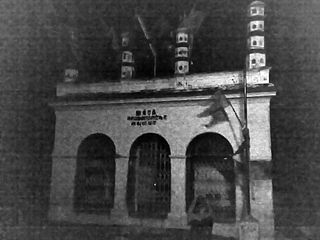
Palli Chandai is a small village near Keeladi the famous archeological site of Tamil Nadu on the border of Madurai and Sivaganga districts. The grave of Hazrat Saalaar Shah Shaheed who was a soldier in the army of Qutb Sulthan Syed Ibrahim Shaheed of Erwadi and Hazrat Sulthan Sikandhar Badusha of Thiruparankundram in Madurai is located here. The anniversary Urus festival of this dargah is commemorated in the Islamic month of Safar. The mosque and dargah are renovated by local Muslims.

Melakkal is a village in Madurai district, Tamil Nadu, India, where the grave of Varushai Syed Ibrahim Waliullah is found.

Karseri is a small village near Sakkimangalam in the Madurai West union of Madurai District. Though being a small village it is famous for the grave of Syed Ibrahim Shaheed who was a soldier in the army of Qutb Sulthan Syed Ibrahim Shaheed of Erwadi and Sulthan Sikandhar Badusha of Thiruparankundram in Madurai. The anniversary Urus festival of this dargah is commemorated on the 15th night of the Islamic month of Jamadul awwal.
This is a list of notable Islamic shrines in Tamil Nadu, a state of India.
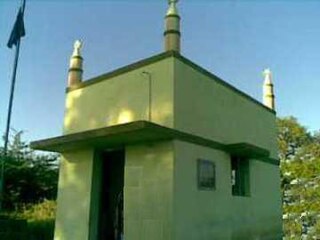
Meesal is a village in the Mudukulathur taluk of Ramanathapuram district of Tamil Nadu, India.
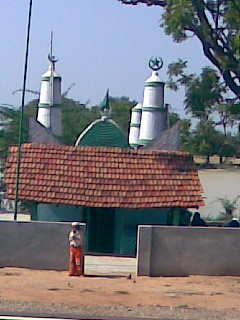
Thachu oorani is a village locality near Mayakulam between Kilakkarai and Erwadi dargah in the East Coast Road in Ramanathapuram district where the grave of Hazrat Syed Mursal Ibrahim Shaheed a descendant of Badhusha Sulthan Syed Ibrahim Shaheed and Father of Hazrat Nalla Ibrahim waliyullah razi is found. Syed Mursal Ibrahim Shaheed is the grand son of Hazrat Varushai Syed Ibrahim waliyullah whose grave is found at Melakkal Kanavai in Madurai district.
S. Syed Ghouse Basha is a politician from the Indian state of Tamil Nadu. He belongs to the Dravida Munnetra Kazhagam (DMK). He is a former Member of the Tamil Nadu Legislative Assembly who represented the Madurai Central. He was elected in a by-election in 2006 caused by the death of the previous member P. T. R. Palanivel Rajan.
He hails from Kazimar Street in Madurai and descendant of Kazi Syed Tajuddin hence a huqdar of Kazimar Big Mosque. He is former Deputy Mayor of Madurai Municipal Corporation and former member of Tamil Nadu Waqf Board.

The Thiruparankundram Dargah is at the top of the Thiruparankundram hill in Tamil Nadu, India. It is a famous Islamic dargah (shrine), with the grave of Islamic saint Sultan Sikandhar Badushah shaheed.

Kazimar Periya Pallivasal or Kazimar Big Mosque is the oldest mosque in Madurai city, Tamil Nadu, India constructed in the year 1284AD and continues to be in existence for more than 7 centuries till today. The mosque was founded by Kazi Syed Tajuddin, a descendant of the Islamic prophet Muhammad, who came from Yemen during 13th century and received this land from the King Kulasekara Ku(n) Pandiyan. The mosque which was the first Muslim place of worship in Madurai. The mosque was managed by Syed Tajuddin during his life time followed by his children and descendants hereditarily for more than 7 centuries till today. Almost all of Kazi Syed Tajuddin's descendants have lived in the same locality for more than 700 years, and have managed the mosque since then.
Shahul Hamid, is a mystic saint, Islamic preacher in Tamil Nadu and a 13th generation descendant of the renowned Sufi saint, Muhiyudin Abd al-Qadir al-Jalani. His tomb is located in the eastern coast of Bay of Bengal at Nagore, Tamil Nadu, India.
Shāh Kamāl Quḥāfah, was a philanthropist, pioneer, social and religious activist.

















